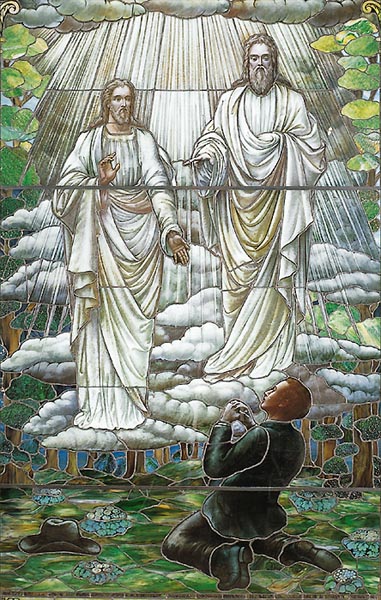
The atonement of Jesus Christ is the single most important event that has or ever will occur in the existence of the earth. Through this incomprehensible act of self-sacrifice, mercy satisfies the absolute demands of justice required by broken commandments of God (Alma 34:15-16). Atonement literally means to set at one. The atonement of Jesus Christ reconciles all things that have estranged us from the Father. Thus, only through the atonement of Jesus Christ can we be brought back into full favor with the Father (John 14:6). When we come before God to be judged, Christ will plead our case before Him and if we have been true and faithful, the Father will accept his Son’s sacrifice in our behalf (D&C 45:3-5). By being set at one with the Father we are granted innumerable blessings — we become perfect in every way, just as Christ and the Father are perfect (John 17:20-23; D&C 35:2; Hebrews 2:10-11; Revelation 21:6-7).
The Act of the Atonement
The pinnacle and defining event of Christ’s ministry on this earth was when He bowed beneath all of the sins and imperfections that we as God’s children have experienced or will experience. From the time that He knelt in the Garden of Gethsemane to the time that He said “it is finished” on the cross, the entire world hung in the balance. Our very souls, billions if not trillions of souls were at stake; He knew it and yet, He came off victorious. He drank from the bitterest of cups, not necessarily because He wanted to, but because He was willing to submit Himself to the will of the Father in all things. In order for us to be spared from destruction and eternal torment, it HAD to be done (Luke 22:41-42; Isaiah 51:22). What Christ did in those blood and tear-stained hours allows us and this world to exist (D&C 88:6-13, 50). It even gives Christ power over death and sin and allows the resurrection to happen (D&C 88:14; Alma 42:23). To contemplate the weight of this burden He bore is overpowering and yet to know that He personally atoned for my imperfections (Mosiah 15:10) causes “[my] heart to swell as wide as eternity” (Moses 7:41) in love and gratitude for Him.
In addition, when one considers exactly who Christ is, a God himself (Alma 34:9-14), and that he would condescend from his throne on high to submit himself to all of the suffering, torture, beating, and humiliation associated with the atonement, descending below all, just to save you and me is confounding to say the least. If even He who had all power over both heaven and hell could control himself in every way as He bowed beneath the rod of his own creations, then I too should be able to bite my tongue when I want to say something mean, or when I want to do something contrary to His commandments.
Our Part in the Atonement
All people who have lived on this earth are given the free gift of resurrection (Revelation 20:12-13), but for the atonement to have full power in our lives we must satisfy specific requirements (1 John 2:1-6). We need to believe that Christ’s atonement can cleanse us from our imperfections (Mosiah 15:10-13), and have a broken heart and contrite spirit before Christ (3 Nephi 9:19-20). In essence we need to “[become] as [children], submissive, meek, humble, patient, full of love, willing to submit to all things” (Mosiah 3:19). Furthermore, we must be baptized by immersion and receive the gift of the Holy Ghost by one who holds proper authority from God to perform ordinances in His behalf (St. John 3:5; Hebrews 5:1-4). All of these things show that we are willing to submit our will to the Father and that we want to follow Christ’s commandments (John 14:15). Our will is the only thing that we have that we can give to God. Everything else is already His. If we will completely submit our will to God just as Christ did, then the atonement of Jesus Christ can make us white as wool by washing our garments in the blood of the Lamb.

Although it may seem hard at times to live the way Christ asks us to live, he has promised us that if we yoke ourselves to Him, that it will be easy (Matthew 11:28-30). I can say from personal experience that this promise is true. Our part is to believe and live such that our lives are a manifestation of our belief that Christ can set us at one with the Father. While at times this may seem a heavy burden, Christ and his Atonement are there to help us in our journey. In addition, we have the Holy Ghost to provide comfort and encouragement that we are on the correct path.

More importantly though is whether or not we will accept this infinitely priceless gift into our lives by believing in the power that Christ gained over sin and death. If we do we will be spared suffering and be granted glory in the mansions of the Father (St. John 14:2, Enos 1:27). The mercy of this doctrine is profound — that “God so loved the world that he gave his Only Begotten Son, that whosoever believeth in him should never perish, but have everlasting life” (St. John 3:16).
The Atonement in Salvation
With regard to salvation, the atonement provides mercy or justice for all people who will fall into one of three categories. First, little children and those that do not know the law are redeemed (Mosiah 3:16, Moroni 8:12-13, D&C 29:46-47, 2nd Nephi 9:25-26, Mosiah 3:11). Second, those who do know the law and repent are saved from suffering for their sins (Mosiah 3:12; Alma 34:15-16; D&C 19:16). Third, those who do know the law of God and choose not to repent receive just punishment (Alma 34:16; Alma 42: 24; D&C 19:17-18; Isaiah 51:22-23).
I invite you: come unto Christ; come drink from a Fountain that is springing up unto everlasting life (St. John 4:14) and eat Living Bread (St. John 6:47-58). You will never hunger or thirst again. There is nothing, nothing, but peace, joy, and happiness to be found in the Gospel of Jesus Christ. I know this, because I have experienced it in my own life and continue to do so — I know the promises of God are sure and true.
See “The Plan of Salvation“
 It might be said that the doctrine of the trinity is the very first of all doctrines in which Latter-day Saint teachings differ from the traditional Christian view. The first prophet called of God in modern times was Joseph Smith. When he was a boy, disputes among churches prompted him to ask God for himself which church preached the eternal truth about God and salvation. In answer, God the Father and Jesus Christ
It might be said that the doctrine of the trinity is the very first of all doctrines in which Latter-day Saint teachings differ from the traditional Christian view. The first prophet called of God in modern times was Joseph Smith. When he was a boy, disputes among churches prompted him to ask God for himself which church preached the eternal truth about God and salvation. In answer, God the Father and Jesus Christ  Q. How do you pray?
Q. How do you pray?



